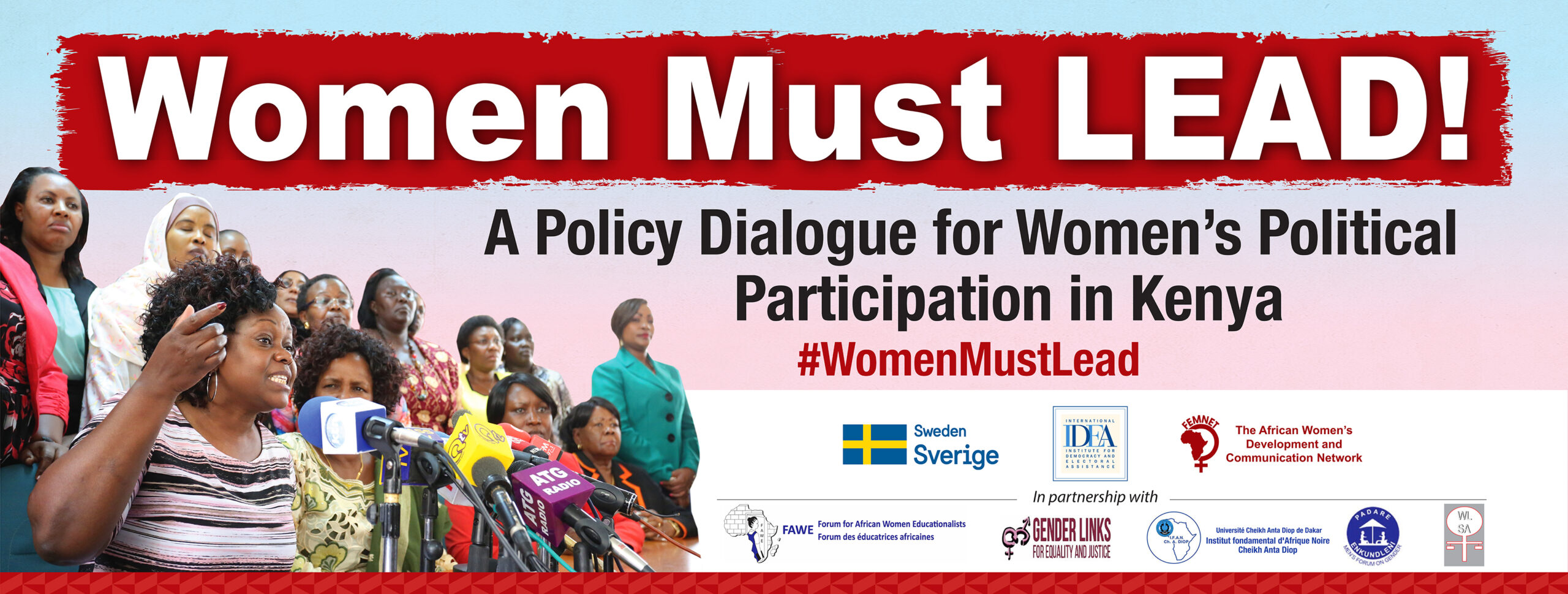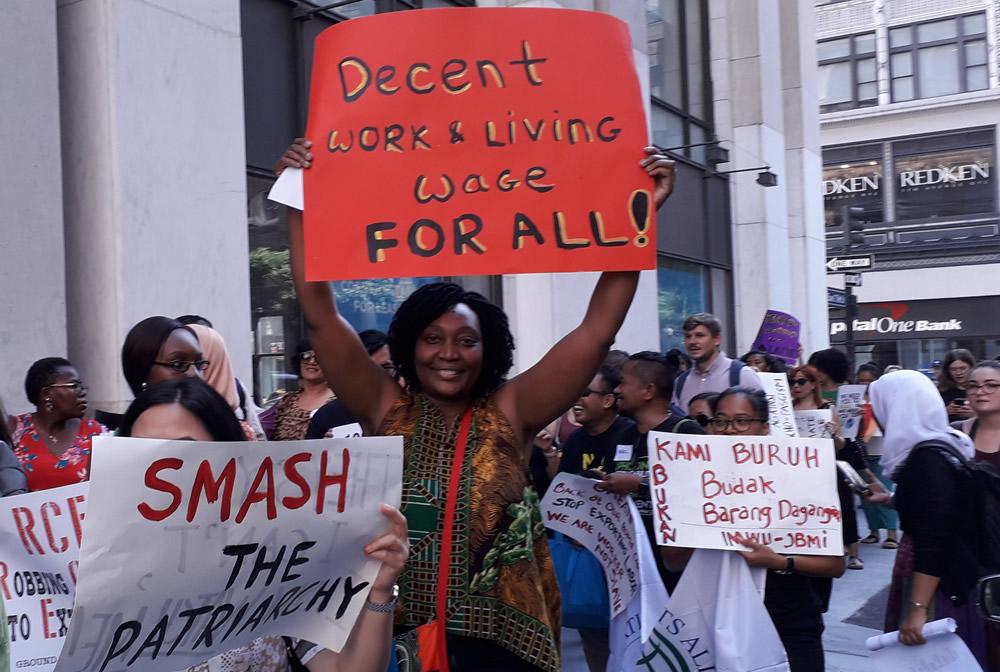Interrogating Gender & Elections and Envisioning Women’s Leadership Post 2015
For Immediate Release: 23rd November 2012
Interrogating Gender & Elections and Envisioning Women’s Leadership Post 2015
Lilongwe, Malawi – The African Women’s Development and Communication Network (FEMNET) in collaboration with Malawi NGO Gender Coordinating Network and in partnership with United Nations Development Programme (UNDP) will be holding the Fourth Regional Conference for African Women in Political Leadership in Lilongwe, Malawi from November 26th to 28th 2012.
FEMNET invites members of the media to attend the opening session of the Conference on the 26th of November from 9:00am – 11:00am as well as to the public forum, “Whose Story is it? The Truth about Media, Gender & Elections” on November 27th from 6:00 – 8:00PM. Please see attached programme for more information.
For more Information please Contact:
Victor Maulidi +265999414028/ +2651771171 vic.maulidi@gmail.com
Interrogating Gender & Elections and Envisioning Women’s Leadership Post 2015
Lilongwe, Malawi – The African Women’s Development and Communication Network (FEMNET) in collaboration with Malawi NGO Gender Coordinating Network and in partnership with United Nations Development Programme (UNDP) will be holding the Fourth Regional Conference for African Women in Political Leadership in Lilongwe, Malawi from November 26th to 28th 2012.
FEMNET invites members of the media to attend the opening session of the Conference on the 26th of November from 9:00am – 11:00am as well as to the public forum, “Whose Story is it? The Truth about Media, Gender & Elections” on November 27th from 6:00 – 8:00PM. Please see attached programme for more information.
For more Information please Contact:
Victor Maulidi +265999414028/ +2651771171 vic.maulidi@gmail.com
The Annual Regional Conference is a platform for African women in political leadership to meet, interact, share experiences and collectively devise ways to overcome the persistent challenges that hinder women’s equal and effective participation in decision making processes. The conferences have been held in Togo (2009), Zambia (2010) and Kenya (2011).
The Conference brings together seasoned women politicians as well as political aspirants from countries holding elections in 2012-2015, leading women’s rights activists, civil society and research organisations engaged in women’s leadership development, and key development partners who support women’s political participation initiatives from seventeen African countries namely: Algeria, Botswana, Burkina Faso, Egypt, Ethiopia, Ghana, Kenya, Libya, Malawi, Mali, Mauritius, Nigeria, Rwanda, South Africa, Swaziland, Togo, and Tunisia.
The Conference will be held at the Sogecoa Golden Peacock Hotel in Lilongwe, Malawi and will be officially opened by Her Excellency Joyce Banda, President of the Republic of Malawi.
Notes:
African women currently occupy 20.3% of parliamentary seats in Sub-Saharan Africa. The world average is 20.2% with Nordic countries leading the way at 42%. The proportion of African women in parliament continues to rise in tandem with the average across all regions. In a span of 15 years the proportion of women in parliament world-wide and in Sub-Saharan Africa has almost doubled, compared to the 11% reported in 1997.
Several significant gains have been made for women in political leadership. Africa embraced its second female president when President Joyce Banda assumed power in Malawi in April 2012. The African Union Commission also elected its first female Chairperson, Dr. Nkosazana Dlamini Zuma, during the 19th Ordinary Session of the African Union Assembly in July 2012. Senegal and Algeria joined the ranks of a select few African states when their elections yielded 42.7% and 31.6% women in parliament respectively. Algeria saw an incredible four-fold increase from the previous parliament which had only 7.7% women’s representation, and Senegal became the first West African nation to cross the 30% threshold.
Currently, 9 African countries meet the 30% United Nations threshold for women’s representation: Rwanda (56.3%), Seychelles (43.8%), Senegal, South Africa (42.3%), Mozambique (39.2), Tanzania (36%), Uganda (35%), Algeria, and Burundi (30.5%). Rwanda remains the only nation to have achieved gender parity.
[download id=”2287″]
The Conference brings together seasoned women politicians as well as political aspirants from countries holding elections in 2012-2015, leading women’s rights activists, civil society and research organisations engaged in women’s leadership development, and key development partners who support women’s political participation initiatives from seventeen African countries namely: Algeria, Botswana, Burkina Faso, Egypt, Ethiopia, Ghana, Kenya, Libya, Malawi, Mali, Mauritius, Nigeria, Rwanda, South Africa, Swaziland, Togo, and Tunisia.
The Conference will be held at the Sogecoa Golden Peacock Hotel in Lilongwe, Malawi and will be officially opened by Her Excellency Joyce Banda, President of the Republic of Malawi.
Notes:
African women currently occupy 20.3% of parliamentary seats in Sub-Saharan Africa. The world average is 20.2% with Nordic countries leading the way at 42%. The proportion of African women in parliament continues to rise in tandem with the average across all regions. In a span of 15 years the proportion of women in parliament world-wide and in Sub-Saharan Africa has almost doubled, compared to the 11% reported in 1997.
Several significant gains have been made for women in political leadership. Africa embraced its second female president when President Joyce Banda assumed power in Malawi in April 2012. The African Union Commission also elected its first female Chairperson, Dr. Nkosazana Dlamini Zuma, during the 19th Ordinary Session of the African Union Assembly in July 2012. Senegal and Algeria joined the ranks of a select few African states when their elections yielded 42.7% and 31.6% women in parliament respectively. Algeria saw an incredible four-fold increase from the previous parliament which had only 7.7% women’s representation, and Senegal became the first West African nation to cross the 30% threshold.
Currently, 9 African countries meet the 30% United Nations threshold for women’s representation: Rwanda (56.3%), Seychelles (43.8%), Senegal, South Africa (42.3%), Mozambique (39.2), Tanzania (36%), Uganda (35%), Algeria, and Burundi (30.5%). Rwanda remains the only nation to have achieved gender parity.
[download id=”2287″]
Related Tags
Related Posts
“Women Must LEAD! We need feminist leadership in Kenya”
Press Statement For Immediate Release: Nairobi, 29th August 2020 Ten years after the promulgation of the Constitution of
Learn MoreFEMNET urges more commitment to the delivery of the 2030 Agenda for Sustainable Development
New York, 19th July 2019 – The African Women’s Development and Communication Network, FEMNET alongside hundreds of women’s
Learn More







